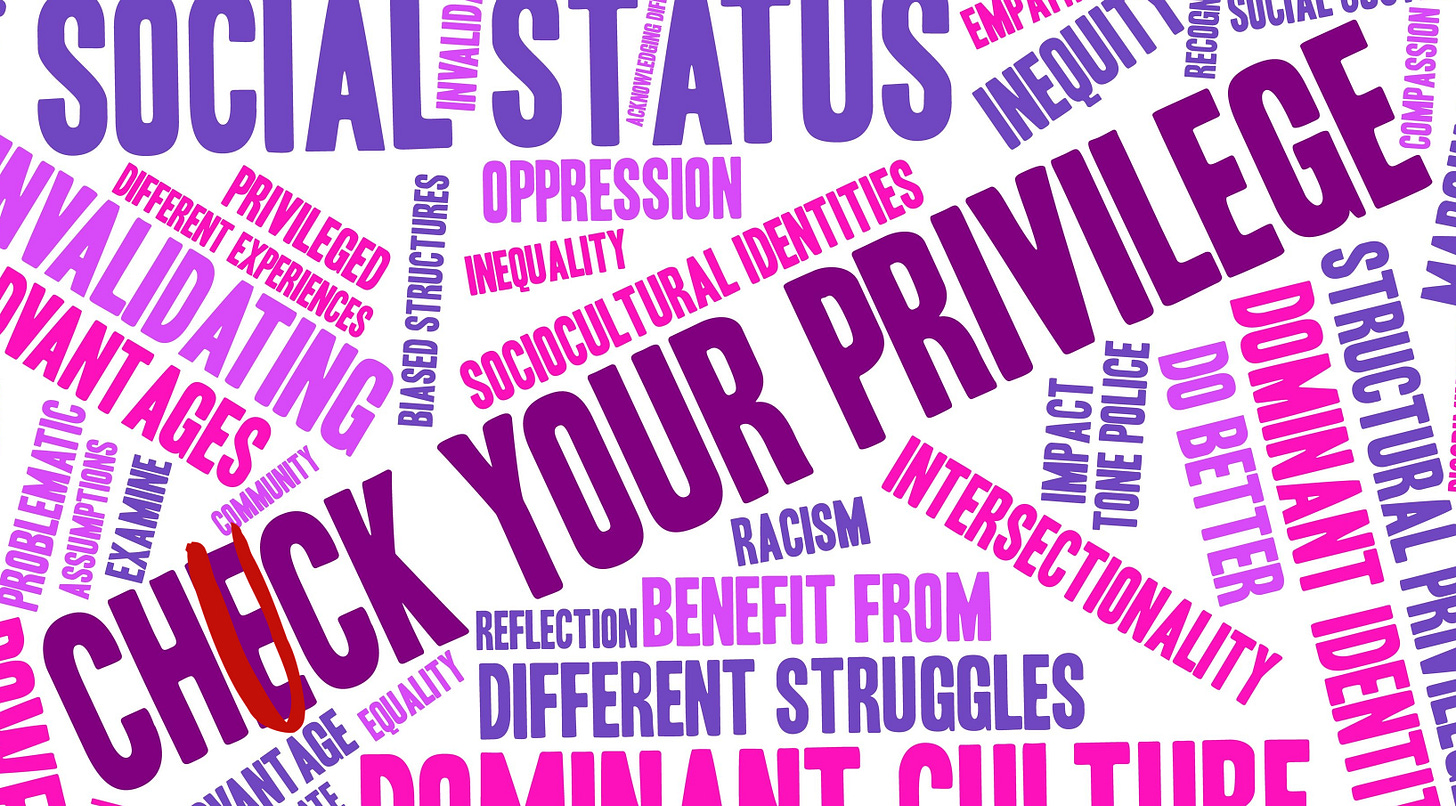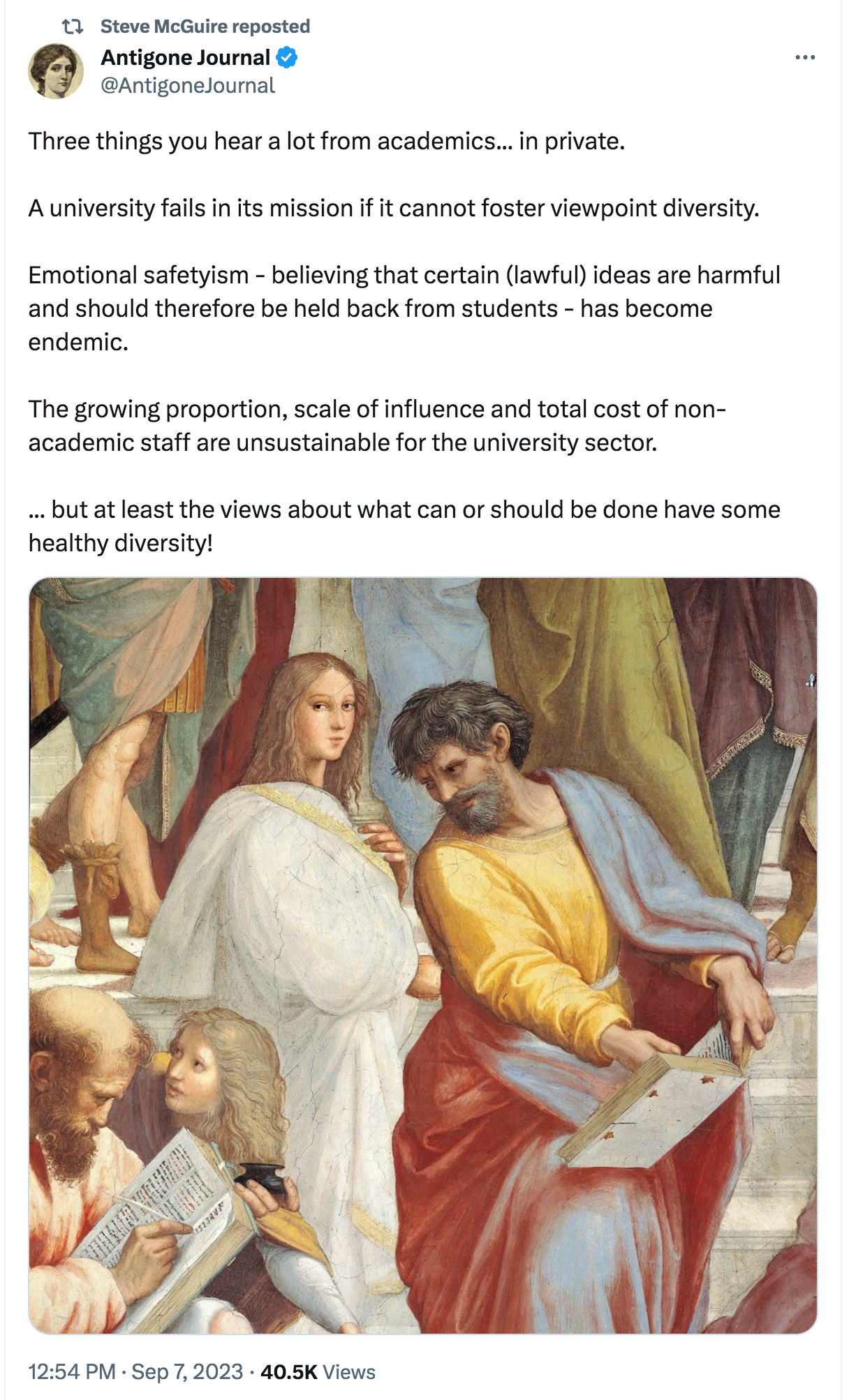E-Pluribus | September 8, 2023
Mike Pence’s conservatism: nothing new under the sun; the harm(s) of race-based sentencing; and what about *your* privilege?
A round-up of the latest and best writing and musings on the rise of illiberalism in the public discourse:
Noah Rothman: Pence’s Conservatism Speech: It’s Hip to Be Square
While Mike Pence is trying to distance himself from his former boss and distinguish himself from his campaign rivals, he’s not trying to cast himself as a radical. On the contrary, Noah Rothman reports at National Review, Pence is reminding primary voters that what made conservatism work in the past for Republicans can also make it a winning message in the present and in the future.
Will the Republican Party be a conservative party or a populist party?
Projects designed to marry these two competing political philosophies have thus far fallen short. Those failures were inevitable, the former vice president posited, because the two dispositions are in conflict. Pence drew few distinctions between the populism gripping the American Right and the radical progressivism of today’s Left — deservedly, because their distinctions are cosmetic.
[ . . . ]
Pence is an imperfect champion for the brand of conservatism he promoted in New Hampshire, as the contradictions in his speech illustrate. He touted the record of the administration in which he served, which “succeeded because of a conservative agenda, not in spite of it.” Indeed, many of the Trump administration’s successes at home and abroad were conceived by its conventionally conservative officials. But the same cannot be said of its profligate spending record. And it muddies Pence’s critique of Trump, the current front-runner in the GOP primary race, to burnish the former president’s conservative bona fides. Likewise, if Pence is guided by the legacies of Reagan and Coolidge as much as Eisenhower, as he told us, that betrays the extent to which the GOP was always to some extent influenced by right-leaning populism. Another note of discord is that he praised constitutional federalism and the powers reserved for the “sovereign states” while also rejecting the notion that states should seek their own covenants on the issue of abortion, which he likened to slavery.
There are, however, no perfect messengers, and life is full of complexities and trade-offs. No one who respects you enough to level with you will tell you any different. You’re certainly unlikely to hear nagging truths like those from someone who is using you only to enhance his own status. Only the tragically old-fashioned would be so gauche as to quote Reagan unironically, express sincere admiration for the wisdom of America’s Founders, acknowledge the limits of the presidency’s power, and express humility in the face of the challenges before us. Those messages don’t win the news cycle — they’re utterly indifferent to trending topics. Indeed, for those who are intoxicated by the allure of cultural combat, such talk is downright boring.
But maybe it’s because we’ve grown bored with the timeless and enduring that cultural combat has now supplanted more serious fare. Perhaps it’s because too many GOP politicians peddle simple solutions to complex problems that the Right has increasingly failed to secure the incremental victories the American system was designed to produce. Do Republicans think that limited government and the pursuit of liberty are no longer enough to meet today’s challenges? And is it because the GOP has traded its appeal to the vast American middle to throw in with those who seek to radically revise the status quo that it is sacrificing so many winnable races?
Read the whole thing.
Jamie Sarkonak: House Arrest for Impregnating Daughter A Result of Race-Based Sentencing
The details of this Canadian case are difficult to read, and the outcome is disturbing on several levels as well. Jamie Sarkonak reports for the National Post on how Canada’s experiment with race-based sentencing not only undermines the concept of equal justice but also does harm to those groups it is ostensibly intended to help.
Normally, incest would be punished with a jail sentence: two years on the low end, and 14 years maximum. Applying progressive sentencing principles, a majority of the Nova Scotia Court of Appeal decided late August that the father should only have to serve two years of house arrest (more reasonably, the dissenting judge believed that four years in jail was apt).
Incest is considered a serious crime for a number of reasons. Like murder, it’s sanctioned because it comes from a deep cultural taboo — in the west and pretty much everywhere else, too. The taboo likely emerged from the objective harm incest poses to society: incest causes genetic defects, and is often a result of one person’s exploitation of another. Offspring, regardless of age, cannot consent to sex with their parents.
At trial, the Crown had argued that the father should spend four to six years in jail, based on sentences that had been handed out in similar situations. It lost. On appeal, it argued the same. This was a severe crime, and it was made worse because the father violated his position of trust over his disabled daughter. Worse, he impregnated her, risking genetic harm to the child.
[ . . . ]
The trial court, and a majority of the appeal court, didn’t buy the Crown’s argument. Why? Because the offender was remorseful and was determined unlikely to re-offend.
Another reason was that he is Black.
While the Crown established, using past cases, that a jail sentence of four to six years was normal for this kind of crime, the appeal court dismissed this as merely a guideline. The court also noted that the offenders, in previous cases, were not African Nova Scotians. When deciding whether offenders of such heritage should serve house arrest or jail, the court wrote that “a more nuanced approach” was required. In short, a racial discount was to be applied.
“The moral culpability of an African Nova Scotian offender has to be assessed in the context of historic factors and systemic racism, as was done in this case,” wrote the trial judge, with whom the majority of the appeal court agreed. “Sentencing judges should take into account the impact that social and economic deprivation, historical disadvantage, diminished and non-existent opportunities and restricted options may have had on the offender’s moral responsibility.”
As an African Nova Scotian, the father had been impacted by “historical deprivation, social and economic deprivation as well as diminished and virtually non-existent opportunities.” In sentencing, these broad factors didn’t have to be linked to his crime to be relevant — they just needed to be present.
Read it all here.
William Deresiewicz: Chuck Your Privilege
It’s back-to-school time, and William Deresiewicz at Persuasion has a radical idea for the “elite college students of America” who are concerned about “privilege”: take your own medicine. Deresiewicz believes it’s unlikely anyone will take his counsel, but argues that if students can at least exercise some self-awareness, they’ll be less likely to simply point fingers at others from their ivory towers.
Welcome back to another year of higher education in the age of “social justice.” You will be spoon fed watered-down Foucault, offered little bites of Butler, and enticed to snack on crunchy nuggets of Kendi. You will protest violent statues, threatening food, and abusive Halloween costumes. And you will tell each other, no doubt many times, to check your privilege: as male or white or straight or cis or neurotypical or nondisabled.
But here's the thing. It is very convenient to talk about checking your privilege as a member of any of those groups, because that's all you can do with it. You can't diminish it, get rid of it, or transfer it to anybody else. You were born with it, and it is yours for life. So “checking” it, aside from a little discomfort, is pretty much pain-free.
Meanwhile, there is a form of privilege that you can do something about, and it's by far the most important one you have. It is the privilege of money, or in other words, of class.
[ . . . ]
But unlike other forms of privilege, there is something real that you can do with your money: the money you grew up with, or the money you are heading towards. You can renounce it.
You can refuse to take advantage of your parents’ wealth. You can decline to let them pay for college, or for graduate school. You can rebuff them when they offer to support you while you do an internship. You can tell them that you will not let them float you through your twenties. You can give away your trust fund.
You can also refuse to take advantage of your institution’s wealth: that giant endowment, much of it invested in companies that do business in places like China, where they have concentration camps and slave labor, that pays for all those fabulous amenities.
[ . . . ]
Look, almost no one does the things I just suggested. I’m from a comfortable family, and I sure as hell didn’t do them. But if you aren’t going to do them, then at least have the decency to cut the crap about other people’s “privilege,” which is just a way of distracting yourself from your own. You’re all privileged, you golden youth. Be grateful. Be humble. Be real.
Read it all.
Around Twitter
Steve McGuire highlights an astounding anti-viewpoint diversity statement from a law professor in a recent New York Times article:
Also via Steve McGuire, a comment from the editors of Antigone (an “open forum for Classics”) on what professors, less willing to speak publicly than the Davis professor above, think about some recent university trends:
And finally, Colin Wright sets the record straight on the apparently now very controversial claim that sex is binary (click for video):









